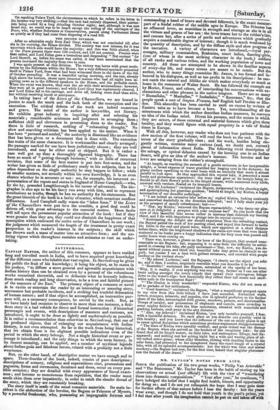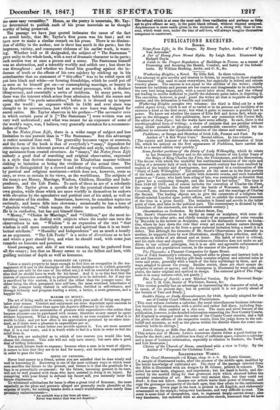MR. TAYLOR'S NOTES FROM LIFE.
SINCE the publication of his two great works, "Philip Van Artevelde" and "The Statesman," Mr. Taylor has been in the habit of storing up his observations on actual (not official) life with the view of "transfusing them into dramatic compositions." "Year after year," he continues, "I have indulged the belief that I might find health, leisure, and opportunity for doing so; and I do not yet relinquish the hope that I may gain time for further efforts of that nature before I lose the faculty : but the years wear away, and though I do not hold that youth is the poet's prime, yet I feel that after youth the imagination cannot be put on and taken off with the same easy versatility." Hence, as the poetry is uncertain, Mr. Tay- lor determined to publish such of his prose materials as he thought worthy of being preserved.
The passage we have just quoted intimates the cause of the fact we noted lately, that Mr. Taylor's first poem was his best ; and we have now to make a similar remark on his prose. There is no diminu- tion of ability in the author, nor is there less merit in the parts; but the largeness, variety, and consequent richness of his earlier work, is want- ing. Whether well or ill designated, the subject of " The Statesman " gave unity to the whole book, with a sort of dramatic character to its parts; each section was at once a person and a scene. The Statesman himself was an abstraction, and a tolerably worldly and selfish one ; but there he was throughout : and whether we found him guarding against the in- fluence of truth or the effects of his own cajolery by sticking up in his antechamber that no statement of " this office" was to be relied upon till put into black and white—or forming friendships, which he could put off as soon as he himself got on—or contemplating marriage, or beauty in his drawingroom—we always had an actual personage, with a distinct idiosyncracy, and essentially a series of incidents. In many parts, too, there was the interest which arises from admission behind the scenes and seeing artifice "in purls naturalibus," before it is dressed up to impose upon the world : an exposure which in 1836 and ever since was thought to be unconscious, but which we now learn was designed for secret satire. Mr. Taylor observes in his preface—"The sarcastic vein in which certain parts of it [" The Statesman "] were written was not very well understood ; and what was meant for an exposure of some of the world's ways, was, I believe, very generally mistaken for a recommen- dation of them.
In the _Notes from Life, there is a wider range of subject and less limitation to one pursuit than in " The Statesman." But this advantage is rather nominal than real. The generality becomes vague or common, and the form of the book is that of everybody's "essay," dependent for attraction upon its inherent powers of thoughts and style, without deriv- ing assistance from created structure. As "essays," the Notes from Life embody a good deal of searching and original observation, expressed in a style that derives character from its Elizabethan manner without sinking to imitation or losing the vividness of the actual time. The matter is distinguished by a shrewd and reflecting worldliness, corrected by poetical and religious sentiment—which does not, however, seem so racy, or even so certain in its views as the worldliness. The subjects of the essays are Money, Marriage, Wisdom, Children, Humility and Inde- pendence, and the Life Poetic. To such of these as are of a scholastic nature Mr. Taylor gives a specific air by the practical character of his own genius, while those which are more worldly in themselves he endows with elevation by the speculative and poetical cast of his mind, as well as the elevation of his studies. Sometimes, however, he considers topics too curiously, and hence falls into slowness; occasionally he has a tone of "absolute wisdom," which tempts the reader to question his authority. He is in cathedra, but has put himself there.
"Money," "Choice in Marriage," and "Children," are the most in- teresting essays, as dealing with subjects where the reader can turn the observations to use. " Wisdom" is an expansion of the text " that wisdom is still more essentially a moral and spiritual than it is an intel- lectual attribute." "Humility and Independence" are as much a homily as an argument. " The Life Poetic " is a series of directions as to how and where a poet should live, and what he should read, with some just remarks on honours and pensions.
Good passages, and able if not wise remarks, may be gathered from all the essays ; but that on Money seems to us the fullest and best, with guiding maxims of depth as well as keenness.
aircH PROPERTY OR LITTLE.
Unless a man's property be large enough to find him an occupation in the ma- nagement of it and in the discharge of the duties incident to it, (which generally, speaking can only be the case of the eldest son) it will be essential to Ins happi- ness that he should have to work for his bread. And it is on this fact that the custom of succession according to primogeniture is to be defended: for if any one is sacrificed by this custom, it is rather the eldest than the younger sons; the eldest being too often pampered into self-love, the most wretched inheritance of all; the younger being trained in self-sacrifice, fortified in self-reliance, and through industry and progress leading a wiser, a better, a more generous, and a happier life.
MAXIMS ON MONEY.
The art of living easily as to money, is to pitch your scale of living one degree below your means. Comfort and enjoyment are more dependent upon easiness in the detail of expenditure than upon one degree's difference in the scale.
Guard against false associations of pleasure with expenditure—the notion that because pleasure can be purchased with money, therefore money cannot be spent without enjoyment. What a thing. costs a man is no true measure of what it is worth to him; and yet how often is his appreciation governed by no other stan- dard, as if there were a pleasure in expenditure per se. Let yourself feel a want before you provide against it. You are more assured that it is a real want; and it is worth while to feel it a little in order to feel the relief from it.
When you are undecided as to which of two courses you would like best, choose the cheapest. This rule will not only save money, but save also a good deal of trifling indecision.
Too much leisure leads to expense; because when a man is in want of objects, it occurs to him that they are to be had for money, and he invents expenditures in order to pass the time.
HINTS ON LENDING.
Never lend money to a friend, unless you are satisfied that he does wisely and well in borrowing it. Borrowing is one of the most ordinary ways in which weak men sacrifice the future to the present, and thence is it that the gratitude for a loan is so proverbially evanescent: for the future, becoming present in its tarn, will not be well pleased with those who have assisted in doing it an injury. By conspiring with your friend to defraud his future self, you naturally incur his future displeasure. To withstand solicitations for loans is often a great trial of firmness; the more especially as the pleas and pretexts alleged are generally made plausible at the expense of truth; for nothing breaks down a mans truthfulness more surely than pecuniary embarrassment-
" An unthrift was a liar from all time:
Never was debtor that was not deceiver."
The refusal which is at once the most safe from vacillation and perhaps as little apt to give offence as any, is the point blank refusal, without reasons assigned. Acquiescence is more easily given in the decisions of a strong will, than in rea- sons, which weak men, under the bias of self-love, will always imagine themselves competent to controvert.


























 Previous page
Previous page